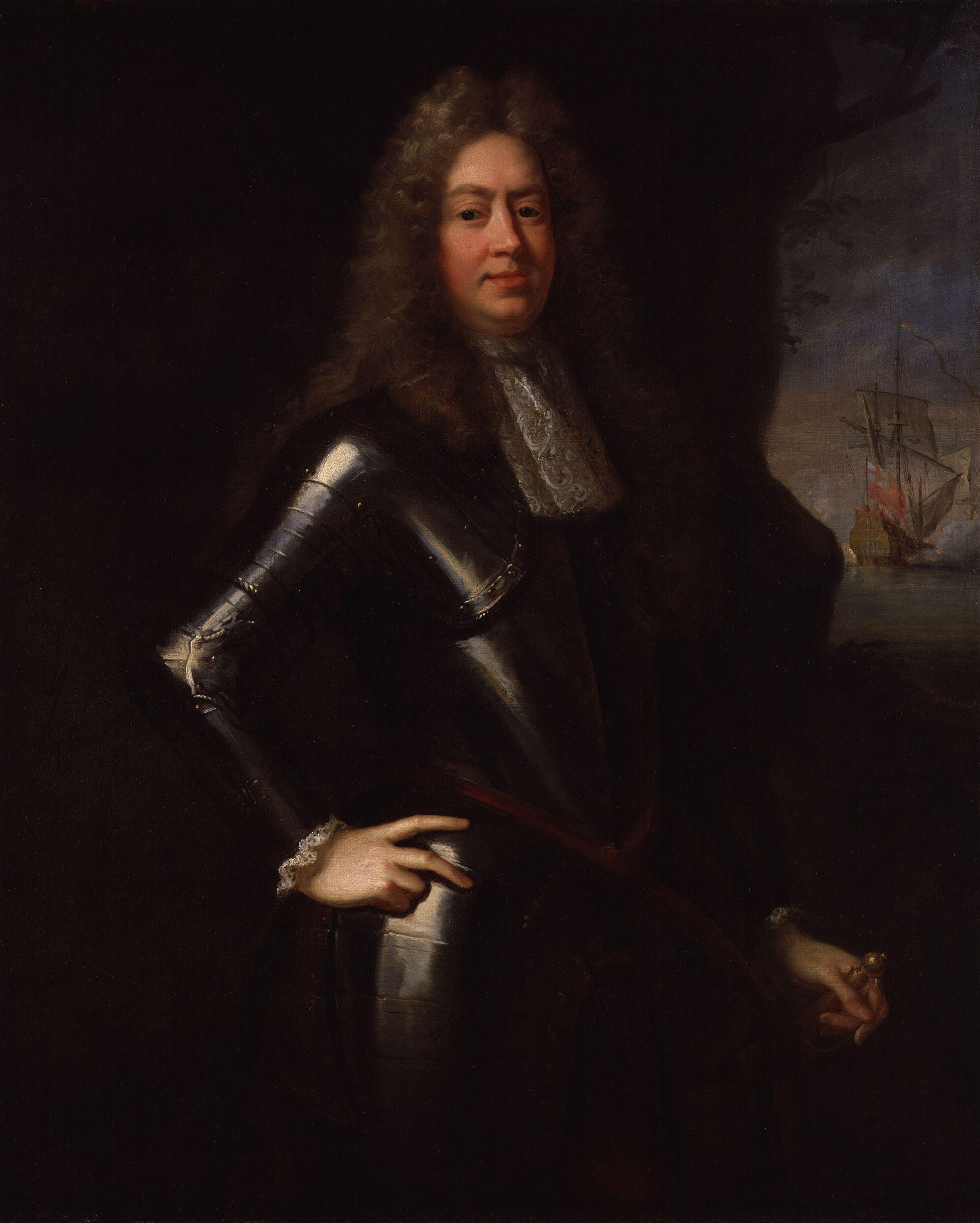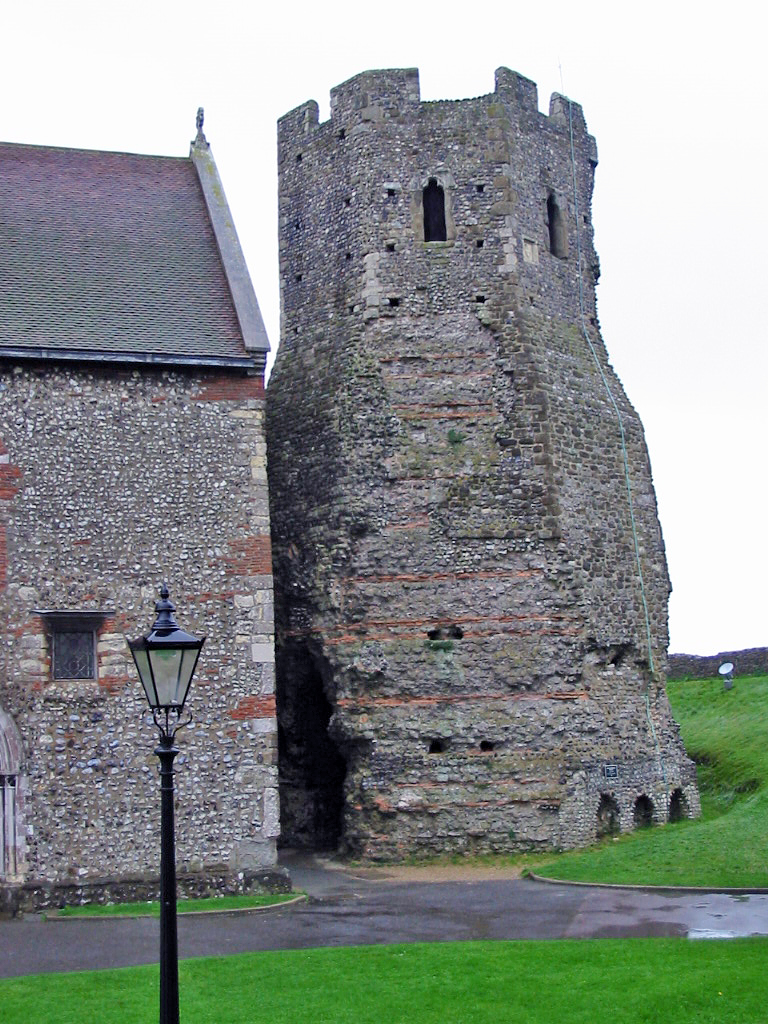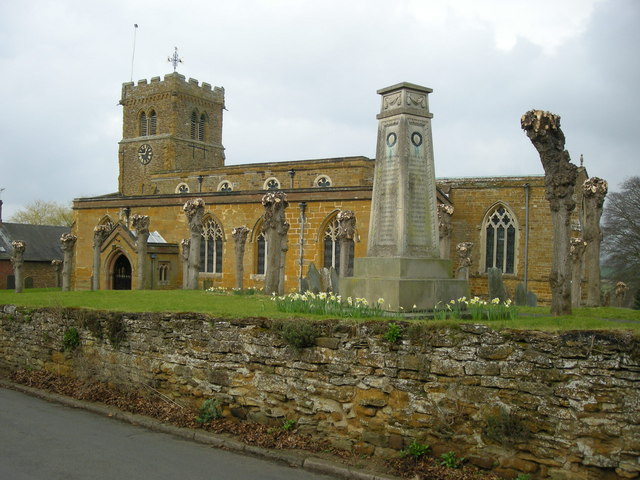|
Robert De Herle
Sir Robert de Herle was an English military commander who was Admiral of all the Fleets about England and Lord Warden of the Cinque Ports during the mid-14th century. Personal He was the son of William de Herle (Chief Justice of the Court of Common Pleas intermittently between 1327–37 and one of the king's council until his death in 1364). Early career Robert de Herle became an important official in the earl of Warwick's administration of the West Midlands, becoming his most senior official for at least the decade beginning after 1339. Robert was overlord at the Leicestershire village of Kirby Muxloe, but more significantly became one of Thomas, the earl of Warwick's most prominent retainers and was granted a life indenture at Wadborough. During the 1340–50s all legal settlements in Warwickshire were subject to the goodwill of Thomas, earl of Warwick, who has been called 'the most powerful lay figure in the West Midlands', at the time. The earl's absolute control over ... [...More Info...] [...Related Items...] OR: [Wikipedia] [Google] [Baidu] |
Admiral Of The Fleet (Royal Navy)
Admiral of the Fleet is a five-star naval officer rank and the highest rank of the Royal Navy formally established in 1688. The five-star NATO rank code is OF-10, equivalent to a field marshal in the British Army or a Marshal of the Royal Air Force. Other than honorary appointments no new admirals of the fleet have been named since 1995. History The origins of the rank can be traced back to John de Beauchamp, 1st Baron Beauchamp de Warwick, who was appointed ' Admiral of the King's Southern, Northern and Western Fleets' on 18 July 1360. The appointment gave the command of the English navy to one person for the first time; this evolved into the post of Admiral of the Fleet. In the days of sailing ships the admiral distinctions then used by the Royal Navy included distinctions related to the fleet being divided into three divisions – red, white, or blue. Each division was assigned at least one admiral, who in turn commanded a number of vice-admirals and rear admirals. Whil ... [...More Info...] [...Related Items...] OR: [Wikipedia] [Google] [Baidu] |
Moulton, Northamptonshire
Moulton is a large village in West Northamptonshire. The population of the civil parish at the 2011 Census was 3,454. The villages name origin is uncertain. 'Mula's farm/settlement' or 'mules' farm/settlement'. Education There are many pre-school facilities in the village including playgroups and nurseries. Primary education in the village is provided by Moulton Primary School, although it is not uncommon for children to attend other primary schools in the local area, for example Overstone, Pitsford or Parklands primary schools. Moulton School and Science College is a comprehensive school providing education for 11- to 18-year-olds, not only to those from Moulton but also to students from the surrounding villages. Moulton is home to Moulton College, an agricultural and trade orientated college. Church The Church of England parish church is dedicated to St Peter and St Paul. It is within the Conservative Evangelical tradition of the Church of England, and it has passed reso ... [...More Info...] [...Related Items...] OR: [Wikipedia] [Google] [Baidu] |
14th-century English Navy Personnel
As a means of recording the passage of time, the 14th century was a century lasting from 1 January 1301 ( MCCCI), to 31 December 1400 ( MCD). It is estimated that the century witnessed the death of more than 45 million lives from political and natural disasters in both Europe and the Mongol Empire. West Africa experienced economic growth and prosperity. In Europe, the Black Death claimed 25 million lives wiping out one third of the European population while the Kingdom of England and the Kingdom of France fought in the protracted Hundred Years' War after the death of Charles IV, King of France led to a claim to the French throne by Edward III, King of England. This period is considered the height of chivalry and marks the beginning of strong separate identities for both England and France as well as the foundation of the Italian Renaissance and Ottoman Empire. In Asia, Tamerlane (Timur), established the Timurid Empire, history's third largest empire to have been ever establish ... [...More Info...] [...Related Items...] OR: [Wikipedia] [Google] [Baidu] |
Lords Warden Of The Cinque Ports
The Lord Warden of the Cinque Ports is a ceremonial official in the United Kingdom. The post dates from at least the 12th century, when the title was Keeper of the Coast, but may be older. The Lord Warden was originally in charge of the Cinque Ports, a group of five (''cinque'' in Norman French) port towns on the southeast coast of England that was formed to collectively supply ships for The Crown in the absence at the time of a formal navy. Today the role is a sinecure and an honorary title, and fourteen towns belong to the Cinque Ports confederation. The title is one of the higher honours bestowed by the Sovereign; it has often been held by members of the Royal Family or prime ministers, especially those who have been influential in defending Britain at times of war. The Lord Warden was solely responsible for the return of all writs to the Crown, along with the collection of taxes and the arrest of criminals. His court was held in St James's church, near Dover Castle, and th ... [...More Info...] [...Related Items...] OR: [Wikipedia] [Google] [Baidu] |
English Admirals
English usually refers to: * English language * English people English may also refer to: Peoples, culture, and language * ''English'', an adjective for something of, from, or related to England ** English national identity, an identity and common culture ** English language in England, a variant of the English language spoken in England * English languages (other) * English studies, the study of English language and literature * ''English'', an Amish term for non-Amish, regardless of ethnicity Individuals * English (surname), a list of notable people with the surname ''English'' * People with the given name ** English McConnell (1882–1928), Irish footballer ** English Fisher (1928–2011), American boxing coach ** English Gardner (b. 1992), American track and field sprinter Places United States * English, Indiana, a town * English, Kentucky, an unincorporated community * English, Brazoria County, Texas, an unincorporated community * Englis ... [...More Info...] [...Related Items...] OR: [Wikipedia] [Google] [Baidu] |
John Beauchamp, 3rd Baron Beauchamp De Somerset
John de Beauchamp, 3rd Baron Beauchamp de Somerset (20 January 1329 – 8 October 1361) was an English peer. Origins He was born at Stoke-sub-Hamdon in Somerset, the eldest son and heir of John de Beauchamp, 2nd Baron Beauchamp of Hatch Beauchamp in Somerset by his wife Margaret St. John. Career He was Warden of the Cinque Ports from 1359 to about 1361. King Edward III issued a commission to Beauchamp from 1359 to act as Warden and Keeper of the Ports of Kent. In 1359 he participated in the expedition to Gascony by King Edward III. In 1360 he was appointed Admiral of the Fleet. Marriage He married Lady Alice Beauchamp, daughter of Sir Thomas de Beauchamp, 11th Earl of Warwick (who was no relation to the Beauchamp family of HatchBased on the different armorials borne by each family, per: Sanders, I.J. English Baronies: A Study of their Origin and Descent 1086-1327, Oxford, 1960, p.51, note 2) by his wife Katherine Mortimer Katherine Mortimer, Countess of Warwick (131 ... [...More Info...] [...Related Items...] OR: [Wikipedia] [Google] [Baidu] |
Admiral Of The Kings Southern, Northern And Western Fleets
K, or k, is the eleventh letter in the Latin alphabet, used in the modern English alphabet, the alphabets of other western European languages and others worldwide. Its name in English is ''kay'' (pronounced ), plural ''kays''. The letter K usually represents the voiceless velar plosive. History The letter K comes from the Greek letter Κ (kappa), which was taken from the Semitic kaph, the symbol for an open hand. This, in turn, was likely adapted by Semitic tribes who had lived in Egypt from the hieroglyph for "hand" representing /ḏ/ in the Egyptian word for hand, ⟨ ḏ-r-t⟩ (likely pronounced in Old Egyptian). The Semites evidently assigned it the sound value instead, because their word for hand started with that sound. K was brought into the Latin alphabet with the name ''ka'' /kaː/ to differentiate it from C, named ''ce'' (pronounced /keː/) and Q, named ''qu'' and pronounced /kuː/. In the earliest Latin inscriptions, the letters C, K and Q were all used t ... [...More Info...] [...Related Items...] OR: [Wikipedia] [Google] [Baidu] |
Dover Castle
Dover Castle is a medieval castle in Dover, Kent, England and is Grade I listed. It was founded in the 11th century and has been described as the "Key to England" due to its defensive significance throughout history. Some sources say it is the largest castle in England, a title also claimed by Windsor Castle. History Iron age This site may have been fortified with earthworks in the Iron Age or earlier, before the Romans invaded in AD 43. This is suggested on the basis of the unusual pattern of the earthworks which does not seem to be a perfect fit for the medieval castle. Excavations have provided evidence of Iron Age occupation within the locality of the castle, but it is not certain whether this is associated with the hillfort. Roman era The site also contains one of Dover's two Roman lighthouses (or pharoses), one of only three surviving Roman-era lighthouses in the world, and the tallest and most complete standing Roman structure in England. It is also claimed to be B ... [...More Info...] [...Related Items...] OR: [Wikipedia] [Google] [Baidu] |
Duchy Of Brittany
The Duchy of Brittany ( br, Dugelezh Breizh, ; french: Duché de Bretagne) was a medieval feudal state that existed between approximately 939 and 1547. Its territory covered the northwestern peninsula of Europe, bordered by the Atlantic Ocean to the west, and the English Channel to the north. It was also less definitively bordered by the river Loire to the south, and Normandy, and other French provinces, to the east. The Duchy was established after the expulsion of Viking armies from the region around 939. The Duchy, in the 10th and 11th centuries, was politically unstable, with the dukes holding only limited power outside their own personal lands. The Duchy had mixed relationships with the neighbouring Duchy of Normandy, sometimes allying itself with Normandy, and at other times, such as the Breton-Norman War, entering into open conflict. Henry II of England invaded Brittany in the mid-12th century and became Count of Nantes in 1158 under a treaty with Conan IV, Duke of Brittany ... [...More Info...] [...Related Items...] OR: [Wikipedia] [Google] [Baidu] |
Walsall
Walsall (, or ; locally ) is a market town and administrative centre in the West Midlands (county), West Midlands County, England. Historic counties of England, Historically part of Staffordshire, it is located north-west of Birmingham, east of Wolverhampton and from Lichfield. Walsall is the administrative centre of the wider Metropolitan Borough of Walsall. It was transferred from Staffordshire to the newly created West Midlands County in 1974. At the 2011 census, the town's built-up area had a population of 67,594, with the wider borough having a List of English districts by population, population of 269,323. Neighbouring settlements in the borough include Darlaston, Brownhills, Pelsall, Willenhall, Bloxwich and Aldridge. History Early settlement The name Walsall is derived from "Walhaz, Walh halh", meaning "valley of the Welsh", referring to the Celtic Britons, British who first lived in the area. However, it is believed that a manor was held here by William Fitz-An ... [...More Info...] [...Related Items...] OR: [Wikipedia] [Google] [Baidu] |
Olney, Buckinghamshire
Olney (, rarely ) is a market town and civil parish in the unitary authority area of the City of Milton Keynes in Buckinghamshire, England. At the 2011 Census, it had a population of 6,477 people. It lies on the River Great Ouse and is the northernmost town in Buckinghamshire, close to the borders of Bedfordshire and Northamptonshire, and equidistant from Northampton, Bedford, Wellingborough and Central Milton Keynes. It is a popular tourist destination, perhaps best known for the and for the ''Olney Hymns'' by William Cowper and John Newton. History First mentioned as ''Ollanege'' (Olla's island) in 932, the town has a history as a lace-making centre. According to the Domesday Book the place, later called ''Olnei,'' was held in 1086 AD by Geoffrey de Montbray, Bishop of Coutances, as its overlord. During the English Civil War, Olney was the site of the Battle of Olney Bridge. In the late 18th century, William Cowper and John Newton collaborated here on what became known ... [...More Info...] [...Related Items...] OR: [Wikipedia] [Google] [Baidu] |
Long Buckby
Long Buckby is a large village and civil parish in West Northamptonshire, England. In 2020 the parish of Long Buckby, which includes the hamlet of Long Buckby Wharf, was estimated to have a population of 4,303. Long Buckby is hill top village, located around north-east of the town of Daventry, and roughly midway between Northampton and Rugby, with each being around to the south-east and north-west respectively. The west of the parish has the A5 road, Grand Union Canal, West Coast Main Line railway and M1 motorway all passing through the Watford Gap, with Watford, Northamptonshire being the next village to the north. Just south of the village is Long Buckby railway station on the Northampton Loop corollary of the West Coast Main Line. History The villages name origin is uncertain. 'Bukki's farm/settlement' or 'Bucca's farm/settlement'. Alternatively, 'he-goat farm/settlement'. Long Buckby has a history going back approximately 1,000 years to the Vikings when all of northe ... [...More Info...] [...Related Items...] OR: [Wikipedia] [Google] [Baidu] |



_Artist's_Impression.jpg)
.jpg)
